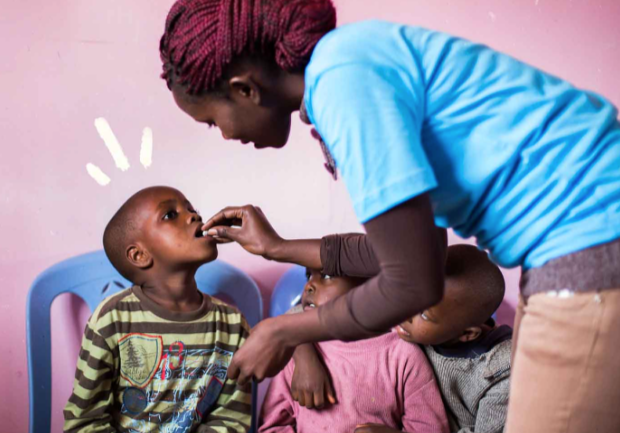
(Photo courtesy of Shining Hope for Communities)
Kennedy Odede is a member of the inaugural class of the Aspen Institute New Voices Fellows in 2013. Odede, whose new book “Find Me Unafraid“ was recently reviewed by New York Times Columnist David Brooks, founded the Shining Hope for Communities organization in his hometown of Kibera, Kenya, which has the largest slum in Africa. He started the slum’s first tuition-free school for girls as well as a community health clinic, and a community center that includes education outreach, gender violence support groups, and literacy/computer training.
Odede and his wife, American Jessica Posner Odede, who is the COO of Shining Hope for Communities, wrote a new book, “Find Me Unafraid,” about their lives, their love story, and their important work. We asked Kennedy a few questions about the book:
Aspen Idea: In your book, you write about so many challenges you survived while growing up, including domestic violence, sexual abuse, hunger, lack of opportunities, and seeing friends needlessly die. What were some of the sources of your strength and hope that kept you from giving up?
Kennedy Odede: My past and the challenges I faced gave me hope because through all of it, I still survived. One of my biggest sources of strength was reading. I’d read the stories of great men and women who have faced challenges and still held on, like Rosa Parks and Nelson Mandela. I am a strong believer that as long as you’re still breathing, anything is possible!
AI: You have had several fellowships, including being part of the first class of the Aspen Institute New Voices Fellows in 2013. What did you learn and gain from that fellowship year? How did it help you propel your work forward even more?
KO: It is very powerful to tell your own story and the New Voices Fellowship equipped me with the skills I needed to not only share mine, but to take action. The fellowship helped me become even more aware about global issues, which is essential in working in international development. We have to think as a global community — not just as a community in Kenya. The experience with the Institute’s fellowship program also encouraged my interest in writing a book.
AI: One of the most powerful and important aspects of your organization SHOFCO is that it is built by you, someone who is from Kibera and understood the issues that needed to be addressed. What do you advise Americans who want to do something about poverty and other issues in Kenya do to better ensure that forms of assistance are used effectively, by people who truly understand the issues and needs of the community?
KO: Great question. I think it’s important for people to really research the organizations they want to support. Transparency in any charity is very important, not only so you can see where your money is going, but see the impact their programs are actually having.
Additionally, it’s important to collaborate with people in the communities you’re serving. I grew up in the slums that I want to help transform. I experienced the same challenges the community does and I spent years really listening and learning about what they wanted and needed. That is so important. Foreign-led interventions don’t work without leadership from people on the ground. SHOFCO employs over 200 local people in Kibera and Mathare, which supports sustainable change because it is mostly through local leadership.
AI: How can people get involved with SHOFCO, specifically? If they donate, what will the funds make possible?
KO: There are four ways that people can get involved that would really help us:
1) Sponsorship: Our girls are the core of our program model and our communities. One of the best things you can do is to sponsor one of our girls — a sponsorship supports their education, uniforms, school meals, health care, school supplies, and more for an entire year.
2) Fundraising: Through our online donation platform, you can fundraise on your own or with a team to sponsor a student. You can also host a birthday campaign to encourage others to give to SHOFCO in lieu of birthday gifts, or host a local event to garner support.
3) Social Media: Stay connected with us through social media. This really helps spread our mission and work and encourages others to do the same. Follow us on Instagram, Twitter, and Facebook. Don’t forget to say hello!
4) Donate: Every little bit counts in paving a brighter future for our communities
- $29 provides curriculum for our adult literacy courses to empower our community
- $60 provides 15 liters of disinfectant for our community biolatrines, ensuring a sanitary and healthy environment
- $100 provides two meals a day for one student for an entire year
- $500 helps 53 children receive critical health care
Learn more about the book and SHOFCO’s upcoming events.
Holly Kearl manages the alumni program of the New Voices Fellowship.

